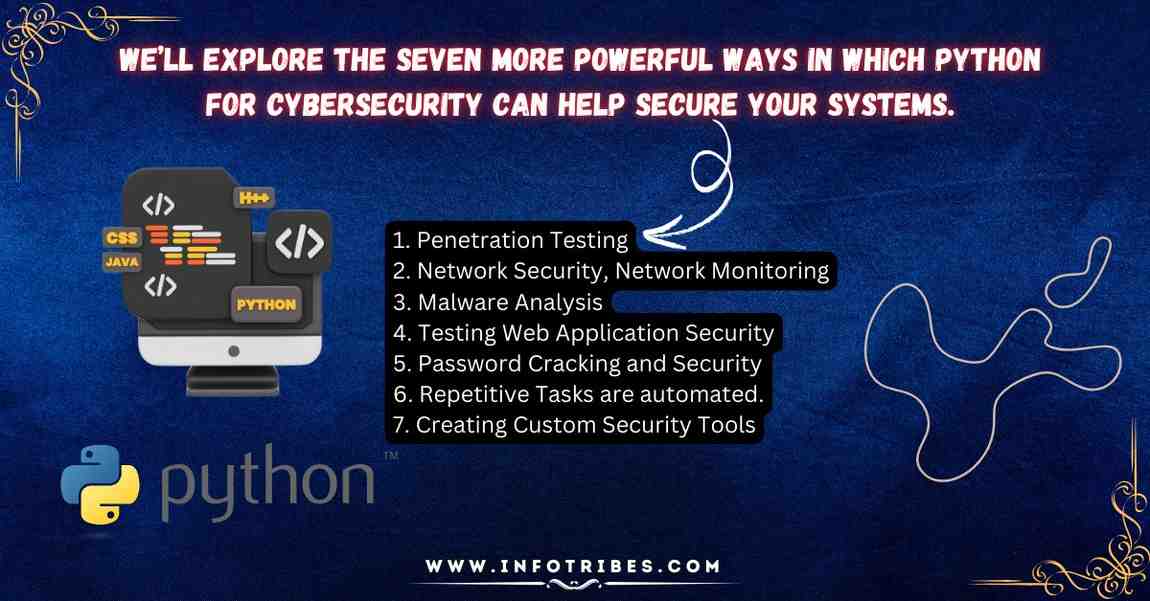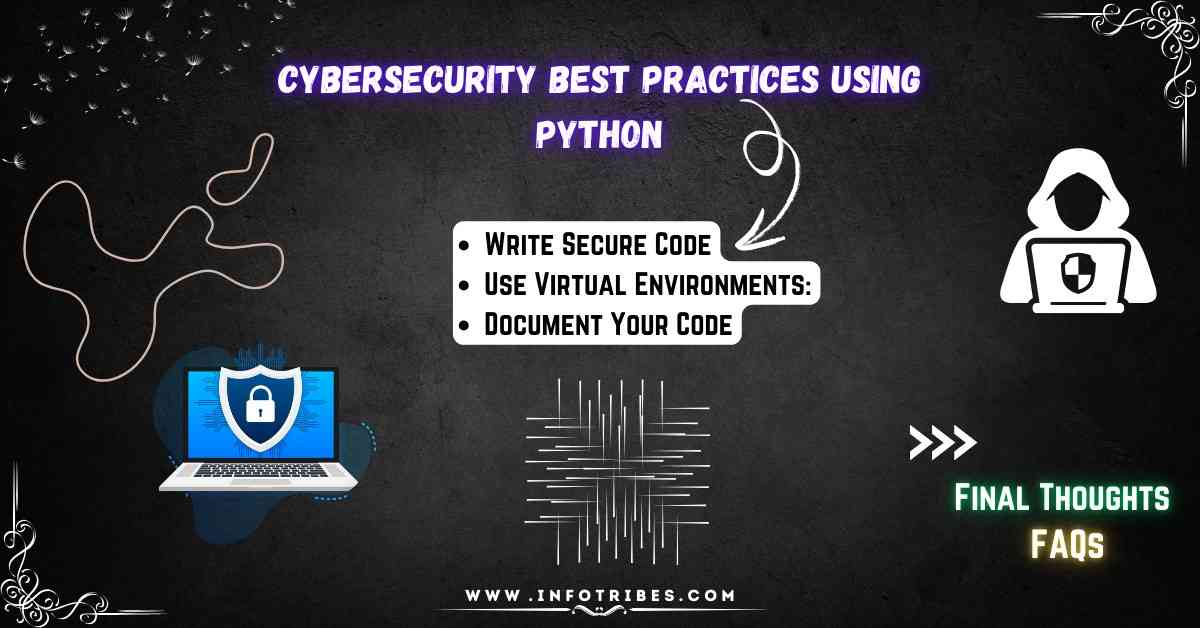Python for Cybersecurity: Get All powerful security tools
With today’s fast paced digital world, it has become exceptionally important for people, business, or government to have their cybersecurity concerns addressed. It is no surprise that there is an urgent requirement for robust security as the number of cyberattacks is rising steadily. Enter Python for Cybersecurity: become a favorite tool for cybersecurity professionals, a versatile and powerful programming language. In this article, I will explore seven powerful ways I have found Python to be used for Cybersecurity, from penetration testing to network monitoring to malware analysis.
Why Python Is Perfect For Cybersecurity:
The main reasons behind the growth of Python for the Cyberspace is its simplicity, versatility and huge libraries of modules they come. Here’s why it stands out:
- Easy to Learn: The syntax of python for cybersecurity is easy enough that beginners and experts could both use python for cybersecurity.
- Rich Libraries: Network scanning and packet manipulation is pre-built functionality we can use from Libraries such as Scapy, Nmap and Requests, web scraping is pre-built functionality from the Requests library.
- Cross-Platform Compatibility: Python for Cybersecurity works great on Windows, macOS, and Linux, and it performs quite well for cybersecurity jobs.
- Community Support: The ecosystem of Python for Cybersecurity is powered by a massive developer and cybersecurity professional community that regularly updates and innovates.
If you want to learn more about Python for cybersecurity, check out Python Security Essentials.

And now, we’ll explore the seven more powerful ways in which Python for Cybersecurity can help secure your systems.
1. Penetration Testing
Penetration testing is a prime use case for Python in security, where Cybersecurity professionals can precede networks and applications for vulnerabilities. Pwntools and Impacket are these tools which enable Ethical hackers to run attack and defense simulations.
- Example: Brute force attacks can be automated and even tested according to password strength using libraries like socket to find open ports (Python for Cybersecurity scripts ) in Python.
- Key Library: Network discovery and security auditing is made possible with Nmap (Python wrapper for Nmap tool).
Python for Cybersecurity provides the tools to detect the vulnerable points before a breach occurs to the penetration testers. Learn more about penetration testing techniques here: Penetration Testing Tools.
You Can Also Read: Best Cybersecurity Remote Jobs Hiring 2025 Now
2. Network Security, Network Monitoring
Monitoring network traffic and looking for anomalies is well suited for Python for Cybersecurity. It is able to analyze packets in real time, and identify suspicious activity.
- Tools: A way to capture and analyze any network packets is with use of Scapy, or to be able to interface with Wireshark, one can use Pyshark.
- Applications: Python for Cybersecurity scripts can log unusual traffic (for example, a pattern of traffic flagged as a potential Distributed Denial-of-Service (DDoS) attack, or unauthorized access).
Visit Network Monitoring with Python if you want more details on network security.
3. Malware Analysis
Using python for cybersecurity, we can circumvent reverse engineer some malware, understand its behavior, and minimize its deflection. Python is used by Cybersecurity analysts for writing Cybersecurity scripts to disassemble evil code and extract useful information.
- Key Tools: YARA-python helps identify malware signatures, pefile tries to analyze Portable Executable (PE) files.
- Real-World Use Case: Scripting Cybersecurity Python to decrypt ransomware payloads or deobfuscate malicious files and extracting embedded URLs from them.
Being a simple tool for malware, python for cybersecurity, simplifies the malware analysis which one can’t deny is vital in the incident response team. Learn more here: Malware Analysis with Python.
4. Testing Web Application Security
Python for Cybersecurity is great for testing and securing web applications, because they are prime targets for attack.
- Automation: Using Python for Cybersecurity scripts, automate the testing of SQL injection, cross-site scripting (XSS), directory traversal.
- Frameworks: One of the tools for database vulnerability detection is SQLMap (written in Python for Cybersecurity), for example.
- Scraping for Security: In Python for Cybersecurity’s Requests and BeautifulSoup libraries, we scrape websites to identify exposed sensitive data.
Integrating Python for Cybersecurity into your security testing workflow lets you be sure that web applications will remain robust and secure. Learn more: Web Application Security.
5. Password Cracking and Security
Using Python for Cybersecurity we can test how strong the password is and how weak the credentials are. Ethical password cracking is a hot topic, but it is essential to the job of a pentest.
- Tools: Use Python for Cybersecurity libraries such as Cryptography to perform encryption and decryption, Hashlib ㄤ hashing algorithms.
- Brute-Force Scripts: Brute force attack on hashes to test the flabbiness of password policies.
Python for Cybersecurity’s capabilities support for cybersecurity professionals to ensure that Password Protection Measures are of the standard they should be.. To know in more details, read Password Cracking Techniques.
6. Repetitive Tasks are automated.
Python for Cybersecurity is used to automate many cybersecurity tasks including log analysis, vulnerability scanning and incident response.
- Log Analysis: Miter comes with a few gems like Loguru that make it easy to parse and log analysis for anomalies.
- Vulnerability Scanning: Use Python for Cybersecurity scripts to automate vulnerability scans using open source tool OpenVAS or Nessus.
- Incident Response: With Python for Cybersecurity we can automate the response to detected threats such as blocking IPs and disabling compromised accounts.
In addition to saving time, such automation decreases the chances of human error in the most critical cybersecurity tasks. Learn more about automation: Cybersecurity Automation.
7. Creating Custom Security Tools
Off-the-shelf tools, however, don’t necessarily fit all needs. One of the advantages of Python for Cybersecurity is that it gives cybersecurity experts the ability to create tools that are specific to certain difficulties.
- Custom IDS/IPS: Build a Python based intrusion detection or intrusion prevention system for Cybersecurity.
- Forensic Tools: Here we suggest the development of tools for disk imaging, file integrity monitoring, memory analysis, etc.
- Encryption Tools: The utilities for building secure encryption as well as decryption should be built from cryptography libraries.
With Python for Cybersecurity, the door to creating bespoke Cybersecurity solutions is virtually Wide Open. Learn more about creating custom tools here: Custom Python Security Tools.

Cybersecurity Best Practices Using Python
Keep Libraries Updated: Keep your copies of Python for Cybersecurity libraries up to date with known vulnerabilities.
- Write Secure Code: Always follow secure coding practice to avoid to introduce new vulnerability.
- Use Virtual Environments: Deploying your Python for Cybersecurity projects in isolation helps to avoid dependency conflicts.
- Document Your Code: Keep it organized and have it in clear documentation for attaining cooperation and for reference later on.
You Can Also Read: Top 10 Entry Level Cyber Security Jobs to Kickstart Your Career in 2024
Test Thoroughly: Run the Cybersecurity scripts written in Python in controlled environments before you distribute them in the production.
Final Thoughts
Python for Cybersecurity is so much more than a buzzword— it’s a practical, necessary way to keep digital assets safe. Python for Cybersecurity’s adaptability covers the gamut from penetration testing and malware analysis to network monitoring and automation, which makes it an essential piece of every modern cybersecurity strategy.
- Using these seven powerful ways will allow you to be proactive when it comes to strengthening your systems and beating out cyber threats. Regardless of whether you’re a budding ethical hacker or an experienced security professional, learning Python for Cybersecurity is a skill to learn.
If you are interested in getting some extra material on Python and cybersecurity, make sure to check out the Complete Python Cybersecurity Guide.
- Get started with Python for Cybersecurity today to protect the systems, and explore its potential to conquer the fast-changing world of cybersecurity.
FAQs
1. So, why is Python so great for cybersecurity?
- ANS: Python is so widely used in cybersecurity because it is so simple, has such a large library support, and so flexible. It enables the creation of scripts by cyber security experts in penetration testing, malware analysis, network scanning and a host of other tasks.
2. Among all the approaches, why is Python so excellent for Cybersecurity, and which are the most preferred libraries for Python in a cybersecurity organization?
- ANS: Scapy (for packet manipulation); Requests (for web scraping, HTTP requests), Nmap (for content of the web), Cryptography (for encryption) and Paramiko (SSH handling) are some most commonly used Python libraries for cybersecurity.
3. Can we use Python for penetration testing?
- It is true; Python is used quite often for penetration testing. Offering a set of tools and libraries for automating tasking, exploiting and writing scripts for vulnerability assessment.
4. What can Python be used for to create custom security tools?
- ANS: By using Python you are able to write your own network scanners, password crackers, web vulnerability scanners and for things like malware detection or forensic analysis.
5. Is Python good for first timers in cybersecurity?
- ANS: Absolutely! With python, it’s simple to write your code and it’s easy to read which makes python great for someone that is new to cybersecurity or programming and wants to learn the two at the same time.
6. What Python based open source security tools are there?
- ANS: We do have many security tools for Python, as Metasploit (framework for exploit development), AutoSploit, Wapiti (web vulnerability scanner), and Pyshark (network packet analysis).
7. Which cybersecurity roles can make the most use of Python skills?
- ANS: As it’s powerful enough to automate repetitive tasks, such as preparing reports, reading malicious inputs and logging data, Python roles like penetration testers, ethical hackers, malware analyst, incident response teams, and cybersecurity engineers all benefit greatly from Python skills.







